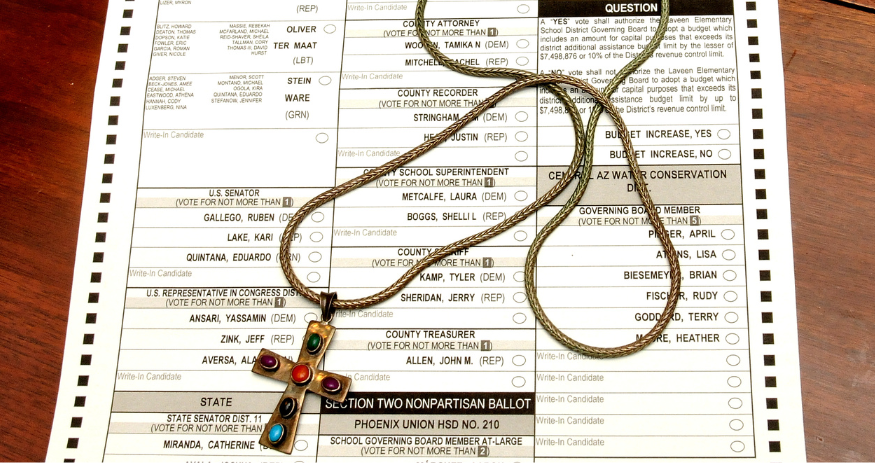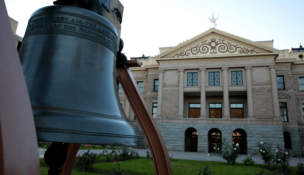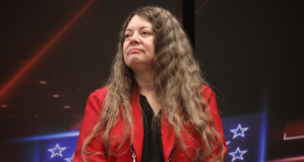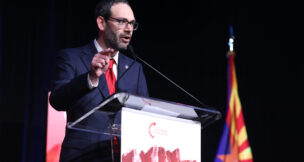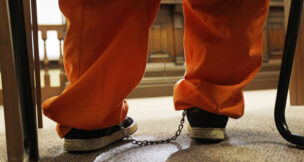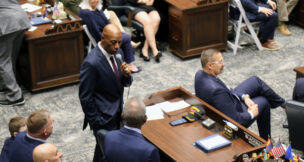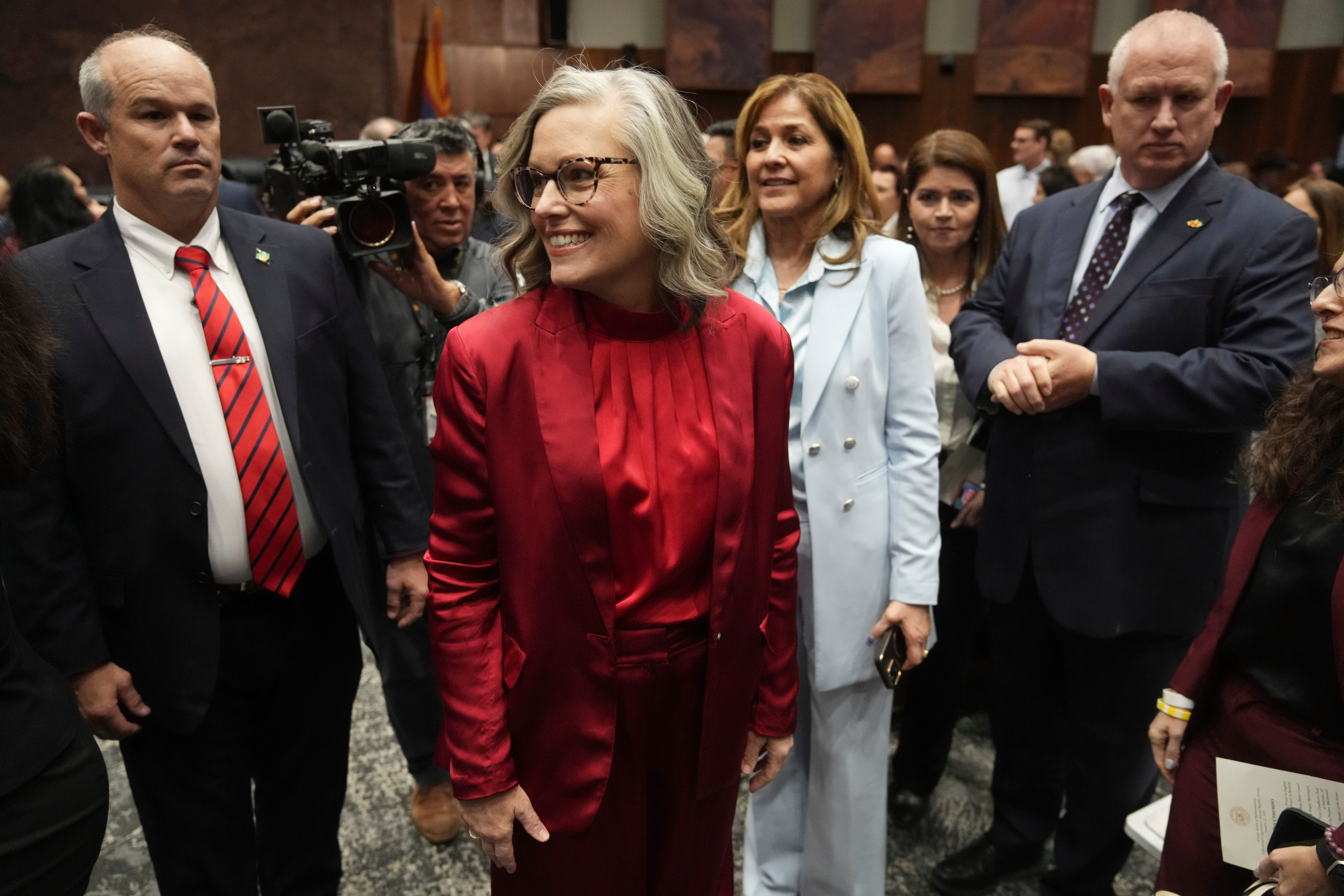Study says 32 million Christians likely not to vote
Howard Fischer, Capitol Media Services//October 14, 2024//
Study says 32 million Christians likely not to vote
Howard Fischer, Capitol Media Services//October 14, 2024//
A new study by a researcher at Arizona Christian University says 32 million Christians who are regular churchgoers are likely to stay home this election.
And that, according to the report by George Barna, will likely hurt Donald Trump more than Kamala Harris.
But Barna, the director of research at the Cultural Research Center at the Glendale school, said it doesn’t have to be that way. The key, he said, could be as simple as pastors “encouraging people to vote in order to fulfill their biblical responsibility.”
“An estimated five million regular churchgoers would be likely to vote as a result of that simple exhortation,” he wrote. “That, in itself, could change the outcome of the election by simply doing their job and getting congregants to fulfill one of their chief duties as an American citizen.”
Len Munsil, president of Arizona Christian University, called this a “blockbuster report.”
“Christians could be the deciding factor in a bunch of federal and state races – and are choosing not to be,” he said in a prepared statement.
There is nothing in either the report or accompanying support material that suggests Munsil, the unsuccessful Republican candidate for governor in 2006, is urging pastors to specifically try to swing their flock one way or the other politically.
But it does say that congregants are “longing for their local church to instruct them on how to think biblically about policy and politics.”
“They don’t want to be told how to vote,” Munsil said. “But they do want to know why they should vote, and how to view political issues from a biblical framework.”
Still, Munsil has some thoughts about what happens when pastors don’t talk about politics.
“The Bible teaches us in Proverbs 29:2 that ‘when the righteous are in authority, the people rejoice, but when a wicked man rules, the people groan,”’ he said. “But without pastors willing to speak about the Bible’s perspective on policy issues, and without them encouraging Christians to vote, it’s hard to see how we can have the kind of godly government that would enable our people to rejoice.”
The idea of politics through the lens of a “biblical framework” fits within the mission of the school.
Founded in 1960 as Southwest Conservative Bible Baptist College, it exists to provide “a biblically integrated, liberal arts education equipping graduates to serve the Lord Jesus Christ in all aspects of life, as leaders of influence and excellence.”
It became Arizona Christian University in 2011, shortly after Munsil took over as president. And he brought his own history, even before his 2006 loss to Democrat Janet Napolitano, but for years before that as the founding president and general counsel for the Center for Arizona Policy, a group that has a history of lobbying against things like same-sex marriage and abortion.
Against all this is the new report by Barna and what it means politically this year if churchgoers stay home.
“Christian churchgoing voters have historically supported the more conservative major-party candidate in a presidential race,” the report by Barna says.
It also says they “appear poised to do so again this election cycle.” But it says fewer churchgoing voters are expected to cast a ballot than in the 2020 race.
“If that expectation holds true, the impact bodes more poorly for President Trump’s prospects for reelection than for Mrs. Harris’ efforts to succeed Joe Biden,” the report says.
Barna pointed out that, on a national basis, the gap between Trump and Biden in 2020 was only about seven million votes. But that, he said, is just part of the picture.
“The real story lies in the margins of victory in swing states, where an average of 60,000 votes per state determined nearly 40% of the electoral votes to win,” he said.
“In this context, the 32 million regular churchgoers who won’t vote in 2024 is a game-changer,” Barna said. “It’s low hanging fruit for pastors as they try to motivate those congregants to carry out their civic duty and honor God through their influence for things that matter in our culture.”
Barna’s report acknowledged that the lower interest in the election is not limited to practicing Christians.
“The research indicates that as many as 104 million people of faith are unlikely to vote in this upcoming election,” it says. That is defined in the report to include those who describe themselves as “a person of religious faith” or someone associated with a recognized religious faith, including Christianity, Judaism, Mormonism, Islam and other faiths.
As to why they’re not voting, the reports says two thirds said they lacked interest in politics and elections. Other reasons cited include a dislike of all the major candidates, a feeling that none of the candidates reflect their most important views, and that the election has become too controversial for their liking.
And there’s something else.
“Almost half of the non-voters were deterred by the belief that the election outcome will be rigged,” according to Barna’s report, with an equal number saying they don’t know enough about candidates to choose one.
The report does more than just identify numbers. It also suggests there are specific reasons behind Christians not voting – and, by extension, things that churches can do to change that.
“Barely more than one half of Christian churches took the simplest election-related action, that of encouraging more congregants to vote in November,” it says. And it finds that slightly less than half of Christian churches were said to have provided congregants with written information about the Bible’s stand on specific issues.
What all that means, the report says, is that there is a pathway to getting more Christians to the polling places: have churches and pastors use their influence.
“It’s troubling that so many churches have distanced themselves from the election, especially given the critical issues at stake and the influence they could wield,” Barna said.
What parishioners want, however, maybe a different issue.
The survey, which formed the basis of the report, asked regular attendees of Christian churches if they would prefer their church to be more or less involved in the 2024 election than it had been in recent years.
“The results show the churchgoing public is split,” the report says.
“A plurality (42%) opted for the status quo, preferring that their church maintain the same level of involvement as in the past,” it says. The other half of the respondents were evenly divided between saying they prefer their church be more involved (25%) or less involved (27%).
Separately, the survey asked how those churchgoers would feel about their church registering voters, providing information about the issues and candidates, encouraged people to vote – but without endorsing anyone – and “taught what the Bible says about current social issues.”
The report said 59% believed that would be helping the community; at the opposite extreme, 11% felt such activities reflected a church that was harming the community.
Barna’s survey of 2,000 voting-age, self-identified Christians across the nation who attend a Christian church at least once a month was conducted between Aug. 26 and Sept. 6. It has a margin of error of 3 percentage points.

